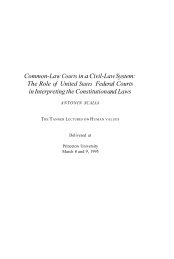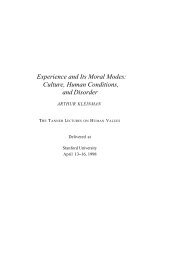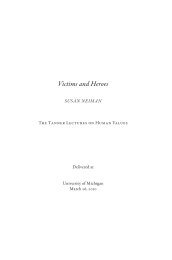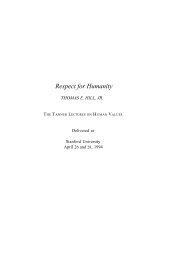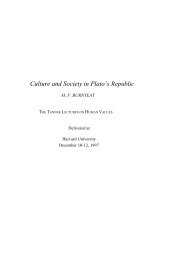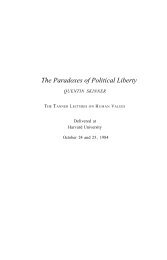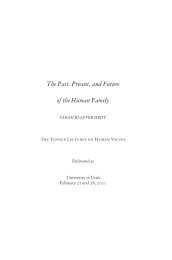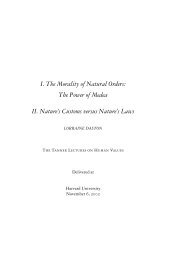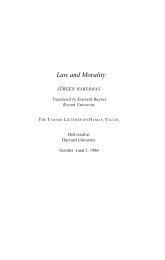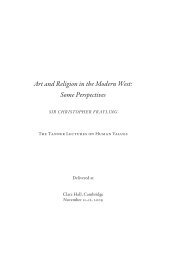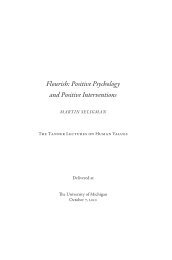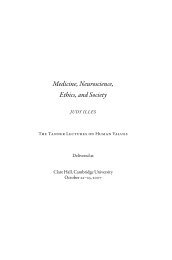Muguerza, Javier - The Tanner Lectures on Human Values
Muguerza, Javier - The Tanner Lectures on Human Values
Muguerza, Javier - The Tanner Lectures on Human Values
You also want an ePaper? Increase the reach of your titles
YUMPU automatically turns print PDFs into web optimized ePapers that Google loves.
114 <str<strong>on</strong>g>The</str<strong>on</strong>g> <str<strong>on</strong>g>Tanner</str<strong>on</strong>g> <str<strong>on</strong>g>Lectures</str<strong>on</strong>g> <strong>on</strong> <strong>Human</strong> <strong>Values</strong>an end.”79 As I suggested before, our imperative has in somesense a negative character, since - behind its apparent grammaticalaffirmati<strong>on</strong> - it does not actually tell us “just what” we oughtto do but instead what we “ought not to do,” that is, not treatourselves, or any<strong>on</strong>e, solely as an instrument. Kant is definite <strong>on</strong>this point when he affirms that the end that man is, is not <strong>on</strong>e ofthose specific ends that we can decide to achieve with our acti<strong>on</strong>sand that are generally means to achieve other ends, as, for example,well-being or happiness. Man is not an end to be effected.As far as man as an end is c<strong>on</strong>cerned, Kant warns, “end is not tobe thought of here as an end to be effected, but as an independentend and therefore in a purely negative way, that is, as somethingthat should never be acted against.” 80“Ends to be effected,” asspecific ends, are, according to Kant, “<strong>on</strong>ly relative ends.” Andfor this reas<strong>on</strong> they cannot give rise to “practical laws” or morallaws, but at most serve as a basis for “hypothetical imperatives,”such as those dictated by prudent c<strong>on</strong>siderati<strong>on</strong> when we say, “ifwe want to remain healthy, we shall have to follow this or thatmedical advice.” But, according to him, the <strong>on</strong>ly specificallymoral end or “independent end” we have - that is, human beinginvested with “absolute value” - requires no less than a “categoricalimperative” such as ours. 81In this sense, and while therelative ends amount to no more than “subjective ends” such asany of us might attempt to realize, men as ends, that is, “pers<strong>on</strong>s,”Kant calls “objective ends,” as in a famous passage from theFoundati<strong>on</strong> of the Metaphysics of Morals that I cannot help butquote:Those beings whose existence does not depend <strong>on</strong> our will,but <strong>on</strong> nature, have, in the case of irrati<strong>on</strong>al beings, a merelyrelative value, as ends, and for that reas<strong>on</strong> are called things;79 Kant, Grundlegung, 428; Kant, Kritik der praktischen Vernunft, Werke,5:132.80 Kant, Grundlegung, 437.81Ibid., 439ff.



